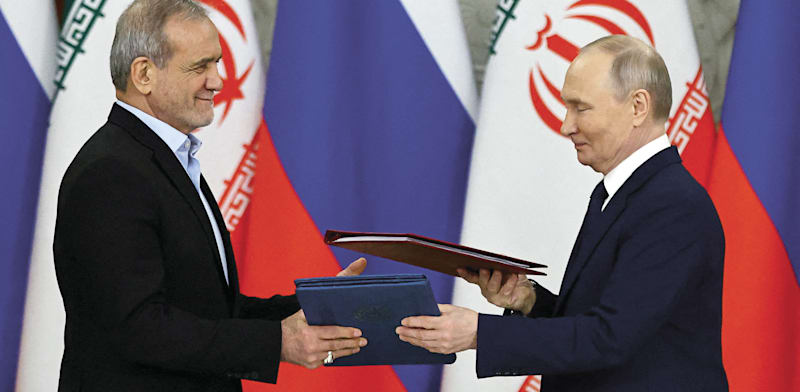

Russia’s voice has been clearly heard on the international stage in the current war between Israel and Iran. The Ministry of Foreign Affairs of the Russian Federation was quick to declare at the weekend, in a gem of Russian hypocrisy, that “an unprovoked attack on another country… is clearly contrary to international law.”
Russia called for the UN Security Council to be convened, and declared that the Israeli attacks were “unacceptable.” After all, Iran is a close ally of Russia, and has been supplying it with growing quantities of weaponry – including UAVs and missile – as it struggles in its invasion of Ukraine. Earlier this year, the two countries signed a strategic cooperation agreement.
In practice, however, on the basis of Russian moves on the ground and the opinions of experts on the country, it can be assessed that Moscow is looking very cautiously at the war taking place, and taking care to avoid real involvement in the current state of things in which it is stuck in the Ukrainian mud. Instead, it is trying to gain a foothold though offers of mediation.
“Putin sees potential in the war”
“From Putin’s point of view, war between Israel and Iran has advantages and disadvantages,” Arkady Mil-Man, a senior researcher and head of the Russia Program at the Institute for National Security Studies, told “Globes.” “On the one hand, the war seems to serve his interests, since world attention is now diverted to Iran, and he can continue his war of attrition against Ukraine without interruption.
“On the other hand,” says Mil-Man, who served as Israel’s ambassador in Moscow from 2003 to 2006, “we are taking about a strike against a strategic partner of Russia, one of the few that it has besides China and North Korea. Iran is still supplying arms to Russia, as we know, and the recent developments are something that undoubtedly don’t cause him satisfaction.”
“Putin sees potential in this war,” opines Dr. Samuel Barnai, an adjunct lecturer at the European Forum and at the Rothberg International School in the Hebrew University of Jerusalem, and at the Department of Jewish History of Ben-Gurion University of the Negev, and an expert on Russia and Eastern Europe. “In the short term, the developments are good for him, since the price of oil is rising, and the revenue from Russian oil and gas is critical to the Russian economy for financing the war in Ukraine.
“The second development that he could see as in his favor is that US President Donald Trump could turn to him to mediate on the matter, because of his connections with Iran. That would extricate him from the dark corner he put himself in with Ukraine. If the US superpower itself requests his help, that will put him back to the center of the international stage.”
Diplomatic aid only
Relations between Iran and Russia have always been close – Russia has supplied Iran with weapons and has assisted in Iran’s nuclear program and in trade – but since the invasion of Ukraine they have become much closer. Russia turned to Iran for military assistance after failing to conquer Ukraine, and Iran sent it thousands of UAVs, and helped it to set up an independent factory on Russian soil that now produces thousands of them each month.
In addition, Iran has supplied spare parts, experts, know-how, and also missiles that Russia uses in its almost daily strikes against Ukraine.
In January this year, the two countries signed a strategic cooperation agreement that includes a commitment not to support each other’s enemies. Critically, the agreement is not a mutual defense alliance that obliges each country to come to the other’s aid , unlike Russia’s agreement with North Korea, for example.
“Now, says Mil-Man, “we are not seeing in open sources any evidence of Russia giving tangible assistance, military equipment or goods, to Iran under Israeli attack. The only support that Russia has offered Iran is diplomatic.”
This support is expressed in public declarations, in the demand for the convening of the UN Security Council, and, according to Dr. Barnai, in “an exceptionally anti-Israel tone” in Russian media in the past few days regarding the Israeli strike on Iran. “It’s important to understand that the tone is undoubtedly dictated from above, on message sheets forwarded to the media channels,” Dr. Barnai explains. “And what we are seeing is the use of Cold War rhetoric, characterization of Israel as an enemy country, and unqualified support for Iran’s right ‘to defend itself with all means’ and so on. Such sharp criticism hasn’t been heard for years.”
According to the experts and military analysts, however, it’s doubtful whether this sharp tone can be translated into military assistance. “Russia is bogged down in Ukraine,” says Mil-Man, “and it’s doubtful whether it is capable of assisting Iran militarily, or of sending it air defense systems that it needs itself because of Ukrainian strikes. The chances of Russia supplying such systems now are low.”
“Russia itself is in need of military equipment, and it is suffering from shortfalls that are causing its losses in Ukraine to keep rising,” says Dr. Barnai. “It’s in no position to send S-300 batteries to Iran, when it is itself vulnerable to strikes from the air, as demonstrated by recent Ukrainian actions.”
Can Putin be a mediator?
The fact that the war in Iran has diverted international attention from the war in Ukraine was clearly seen at the G7 meeting in Canada on Monday. While the leaders of the European members of the organization demanded new and severe measures against Moscow, the US president was focused on the conflict in the Middle East, and hurriedly left the meeting.
His early departure in order “to work on something big,” as he put it, even caused the cancellation of his scheduled meeting with President Volodymyr Zelenskyy of Ukraine, who had traveled all the way to the Canadian Rockies.
Trump did not rule out the possibility of Putin serving as a mediator. Russia has been proposed in the past as a possible destination for holding the enriched uranium that is meant to be transferred beyond Iran’s borders in a future nuclear agreement. “That would be a real rehabilitation of Putin’s injured ego, after he has been barred from the world stage,” says Barnai. “It would be proof that ‘the world can’t keep going round without Moscow’s involvement.’”
In this context, Mil-Man’s view is that Israel must not be tempted to believe that the Russian side is in any way unbiased. He recalls the fact that Russia directly supplied Hezbollah with weapons, and that Russia has let Israel down in the past on various issues, from negotiations with Iran to Syria. “On the Israeli side, there is still a wish to tread a fine line with the Russians, and still a failure to understand the fact that they long ago chose sides. There’s some confusion here,” he told “Globes.”
Published by Globes, Israel business news – en.globes.co.il – on June 18, 2025.
© Copyright of Globes Publisher Itonut (1983) Ltd., 2025.


